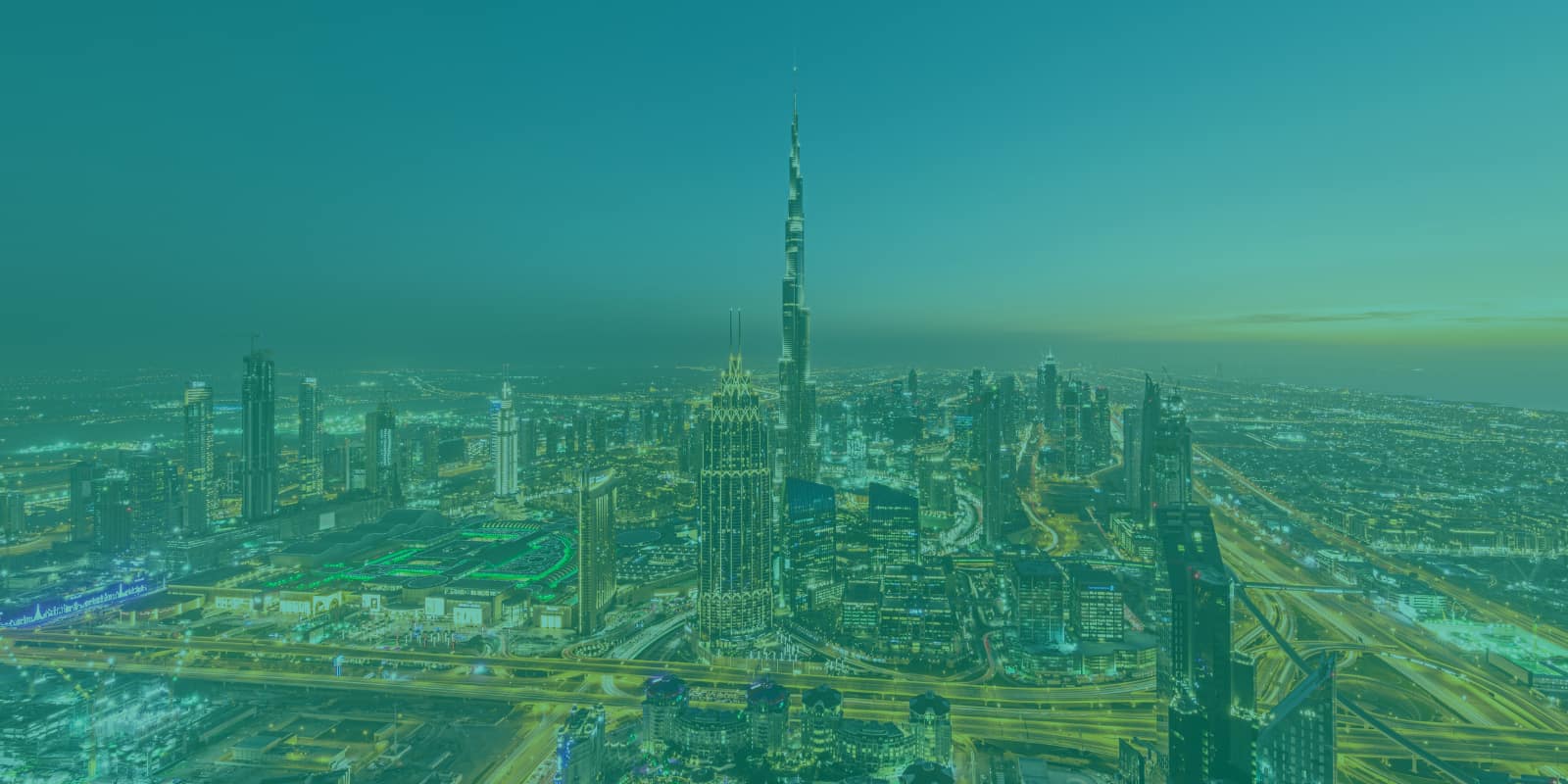EXPLANATION OF DUBAI’S LONG-TERM ECONOMIC VISION – 2031
“We the Emirates 2031” represents a courageous vision and national action plan to take the country’s development to the next level over the next decade. It focuses on various aspects including social, economic, investment and development. The primary aim of this vision is to strengthen the Dubai’s position as a global business partner and an attractive and influential economic centre.
The main national indicators in the “We the Emirates 2031” vision include:
- Raising the country’s GDP from AED 1.49 trillion to AED 3 trillion.
- Increasing the country’s non-oil exports to AED 800 billion.
- Elevating the tourism sector’s contribution to the GDP to AED 450 billion.
- Increasing the value of UAE foreign trade to AED 4 trillion.
- The country ranked first in the world in developing proactive legislation for new economic sectors.
HIGHLIGHTING KEY INITIATIVES AND STRATEGIES DRIVING ECONOMIC GROWTH
UAE CENTENNIAL PLAN 2071
UAE Centennial Plan 2071, was introduced in 2017 and acts as a guide for government initiatives aimed at boosting the UAE’s standing and economic strength. A future-oriented government, first-rate education, a diverse knowledge-based economy, and a contented, cohesive society are the four main pillars upon which the Centennial Plan is based. The UAE hopes to become a global center for luring brilliant minds, ideas, and talent under the banner of “the best economy in the world” by offering unmatched business opportunities, a stable environment, and cutting-edge infrastructure. As a result, the government will invest more in biotechnology, nanotechnology, cognitive sciences, multi-dimensional cumulative manufacturing, and artificial intelligence.
THE EMIRATES BLOCKCHAIN STRATEGY
By 2021, 50% of government transactions should be conducted on blockchains, according to the UAE Government’s Emirates Blockchain Strategy 2021, which was introduced in April 2018.
This change is anticipated to:
- Reduce regular transactions and document processing costs by AED 11 billion.
- Cut 398 million printed documents annually.
- Every year, save 77 million hours of labor.
The UAE aims to offer a safe digital transaction platform by utilizing blockchain technology, guaranteeing data integrity and improving the effectiveness of governmental procedures.
UAE STRATEGY FOR THE FOURTH INDUSTRIAL REVOLUTION
A competitive national economy based on cutting-edge applications that combine material, digital, and biological technologies is the goal of the UAE Strategy for the Fourth Industrial Revolution, which also seeks to solidify the nation’s standing as a global center for the impending industrial revolution. This strategy’s main tenets are the adoption of various genomic medicine plans, medical genomic tourism, and the embrace of a digital economy to increase economic security. To support economic growth, the strategy also calls for the development of cutting-edge technologies, such as 3D printing, the Internet of Things, nanotechnology, and artificial intelligence.
EMPHASIZING DUBAI’S POSITION AS A MAGNET FOR FOREIGN INVESTMENT
Dubai is a global hub for economic expansion and innovation, drawing in talent, investors, and creative startups with its:
- FAST GROWN MARKET: The Dubai Economic Agenda 2033 (D33) seeks to make Dubai one of the top three cities in a number of categories and to double the emirate’s economy in the next ten years by promoting sustainability, diversification, and competitiveness.
- STRATEGIC LOCATION: Dubai is ideally situated to close the time zone difference between East and West.
- GLOBAL FINANCIAL HUB: Dubai aims to rank among the top four global financial centers in the world as part of its ten-year economic transformation plan, D33.
FREE ZONES AND ECONOMIC ZONES IN DUBAI
To promote investment, trade, and economic growth, free zones and economic zones are designated areas that provide legal frameworks and advantages to businesses, both domestic and foreign. Free zones, sometimes referred to as free trade zones or free economic zones, are regions of Dubai that function according to economic laws and guidelines. 100% foreign ownership, potential tax exemptions, 100% profit repatriation, and exemptions from import and export customs duties are just a few advantages available to companies based in free zones. Technology, media, finance, logistics, healthcare, and manufacturing are just a few of the industries or sectors that are the focus of particular free zones. Depending on the requirements of the industry being targeted, each free zone may have a unique set of rules and incentives.
Economic zones, sometimes referred to as industrial zones or economic clusters, are areas designated for mixed-use, commercial, or industrial development that are typically found outside of the city center. Economic zones aim to attract investment and increase economic activity by providing infrastructure, incentives, and facilities tailored to specific industries or sectors. The same incentives and benefits that businesses in free zones enjoy, like tax exemptions or 100% foreign ownership, may not always be available to businesses in economic zones. However, they may still offer advantages such as accelerated regulatory processes, access to specialized infrastructure, and proximity to significant transit hubs. Examples of Dubai’s economic zones are Dubai Maritime City, Dubai South, and Dubai Industrial City.
TAXATION POLICIES IN DUBAI INCLUDING CORPORATE TAX AND VAT
Dubai’s tax laws are meant to draw foreign capital, boost local economy, and keep the city a worldwide business center.
CORPORATE TAX:
- One of the main benefits of doing business in Dubai is the low rate of corporate taxes and zero rate of income taxes at the federal level; nevertheless, some sectors including oil and gas, banking, and tobacco may be subject to particular taxes or fees at the federal or emirate level. For instance, taxes or royalties on production activities could apply to Dubai’s oil and gas firms.
- Companies running outside of approved free zones could also be liable for corporate taxes compliant with UAE laws and regulations. Corporate tax services in the UAE help companies guarantee compliance and streamline their tax procedures, so ensuring efficiency.
VALUE ADDED TAX (VAT):
- The UAE imposed a 5% Value Added Tax (VAT) on the sale of goods and services, including the majority of goods and services offered by businesses, in January 2018.
- From production to distribution to the end user, VAT is applied to the consumption of goods and services at every point of the supply chain.
- Certain goods and services, such as healthcare, education, residential property sales and rentals, and local transportation, may be exempt from VAT.
- Businesses that are registered for VAT must charge VAT on their taxable supplies, keep accurate accounting records, file VAT returns, and send the VAT collected to the government. Businesses must register for VAT if their annual taxable supplies exceed the mandatory registration threshold. Visit our UAE VAT services page for comprehensive insights.
CUSTOMS DUTIES:
- Depending on the kind of goods and their country of origin, Dubai levies customs duties on their import and export.
- Nonetheless, a number of Dubai and UAE free zones provide companies operating there with exemptions or reduced customs duties, which encourages foreign investment and trade even more. For specialized solutions and assurance of adherence to regional laws, check out our Customs Duties Services in the UAE.
DOUBLE TAXATION TREATIES:
- To prevent income from being taxed twice and to promote international investment and trade, the UAE has signed double taxation treaties with more than 100 nations.
- These agreements usually include procedures for information sharing amongst tax authorities as well as guidelines for the distribution of taxing rights among the signatory states.
IMPACT OF TAXATION POLICIES ON BUSINESS SETUP DECISIONS
UAE’s tax laws and policies support Dubai’s appeal as a business-friendly location for both domestic and foreign investors, which promotes national economic growth and development.
REGULATORY FRAMEWORK FOR BUSINESSES IN THE UAE
Federal and local laws, rules, and licensing requirements for both mainland businesses and Freezone jurisdictions make up the regulatory framework for businesses in the United Arab Emirates.
FEDERAL LAWS AND REGULATIONS:
- Federal laws and regulations that are applicable in all emirates have been established by the United Arab Emirates. Important topics covered by these laws include company formation, business operations, labor relations, taxation, and intellectual property.
- Among other federal laws that are pertinent to businesses are the UAE Commercial Companies Law, Federal Law on Commercial Transactions, Federal Tax Procedures Law, Federal Labor Law, and Federal Copyright Law.
EMIRATE-SPECIFIC REGULATIONS:
- Every emirate in the United Arab Emirates has its own set of laws and license requirements for companies doing business.
- The Dubai Department of Economic Development (DED), Dubai Municipality, Dubai Land Department, and Dubai Financial Services Authority (DFSA) are among the regulatory bodies that oversee businesses operating in the Dubai International Financial Centre (DIFC).
COMPANY FORMATION AND LICENSING:
- Before starting operations, businesses in the United Arab Emirates must register and obtain licenses from the appropriate authorities. Depending on the location, legal structure, and type of business activity, different license requirements apply.
- The Department of Economic Development (DED) in each emirate is in charge of granting trade licenses and overseeing corporate operations within the mainland. Free zones have their own regulatory bodies in charge of granting licenses and monitoring companies doing business there.
FINANCIAL REGULATIONS:
- The Central Bank of the United Arab Emirates, Securities and Commodities Authority (SCA), Dubai Financial Services Authority (DFSA) in the case of the DIFC, and Financial Services Regulatory Authority for ADGM (FSRA) are among the regulatory bodies that issue regulations to financial services companies doing business in the United Arab Emirates.
- To maintain stability, openness, and investor protection in the financial industry, these rules regulate banking, insurance, securities trading, asset management, and other financial operations.
INTELLECTUAL PROPERTY PROTECTION:
- Intellectual property rights, such as patents, trademarks, copyrights, and industrial designs, are safeguarded by laws and regulations in the United Arab Emirates. In the UAE, intellectual property rights are registered and enforced by the Ministry of Economy and local intellectual property offices.
BUSINESS REQUIREMENTS, CONSIDERATIONS & ON-GOING COMPLIANCE
Mandatory corporate compliance standards are critical for any firm in the UAE, and complying with these rules guarantees that enterprises run transparently, protecting shareholders’ interests and preventing fraud and corruption.
ULTIMATE BENEFICIAL OWNER (UBO):
In order to maintain transparency for all mainland and free zone businesses (apart from a few entities that are directly or indirectly owned by the government), the UAE mandates that Ultimate Beneficial Owners must be registered. UBO registration services is available by Creation Business Consultant as separate service or as a component of our Annual Compliance Support Package Services.
FINIANCIAL ACCOUNT AUDIT:
A licensed auditor must conduct a financial account audit for all mainland businesses. Within three or six months of the fiscal year’s conclusion, many Free Zone businesses are also required to submit audited financial statements. For both mainland and freezone jurisdictions, Creation Business Consultants can provide audit support services.
VAT REPORTING:
UAE’s VAT rate is set at 5 percent. If a company’s taxable imports and supplies total more than AED 375,000 annually, the company is required to register for VAT. Additionally, companies are not required to register if their annual imports and supplies total more than AED 187,500. Companies must file a monthly or quarterly VAT return and pay the tax authorities on time.
WAGE PROPECTION SYSTEM (WPS) REGISTRATION:
Wage Protection system (WPS) is an electronic salary transfer system through which companies in the private sector pay their employees through banks or approved exchange houses.
SHOWCASING REAL-LIFE EXAMPLES OF BUSINESSES SUCCEEDING IN DUBAI’S ECONOMIC ECOSYSTEM
Dubai’s dynamic economic ecosystem has built many successful businesses recognized worldwide.
- JUMEIRAH GROUP – A luxury hotel company with headquarters in Dubai that manages a portfolio of high-end hotels, resorts, and homes across the globe. The Jumeirah Group was established in 1997 and, thanks to its recognizable buildings like the Burj Al Arab and Jumeirah Beach Hotel, has come to represent luxury and hospitality in Dubai.
- CAREEM – A ride-hailing business based in Dubai that was established in 2012 and provides services throughout South Asia, North Africa, and the Middle East. The innovative technology platform, localized approach to transportation solutions, and strategic alliances with local businesses and authorities are the main factors contributing to Careem’s success.
- ARAMEX – An international logistics and transportation firm with its main office in Dubai that offers freight forwarding, logistics solutions, and expedited delivery. Since its founding in 1982, Aramex has developed into a major force in the logistics sector, taking advantage of Dubai’s advantageous location as a crossing point between the East and the West.
Only a few actual cases of companies prospering in Dubai’s business environment are shown here. There are many more examples worth considering.
TAKEAWAY
Dubai and the United Arab Emirates offer a distinctive business environment with favorable tax laws and legal frameworks. However, adherence to mandatory compliance laws and regulations is crucial to avoiding potential administrative consequences and fines for non-compliance. Ensuring that all our clients are completely compliant with the most recent regulations is a top priority for Creation Business Consultants.
The way businesses are established in the United Arab Emirates has also been significantly impacted by Dubai’s economic policies, particularly through a variety of programs that promote entrepreneurship, investment, and innovation. These policies aim to diversify the economy away from reliance on oil by focusing on sectors like tourism, finance, trade, and logistics.
Interested in discovering more? Contact us today for tailored compliance services and explore the influence of Dubai’s economic policies on business setup in the UAE.
Email: [email protected] | UAE: +971 4 878 6240 | Saudi Arabia: +966 54 511 2494







